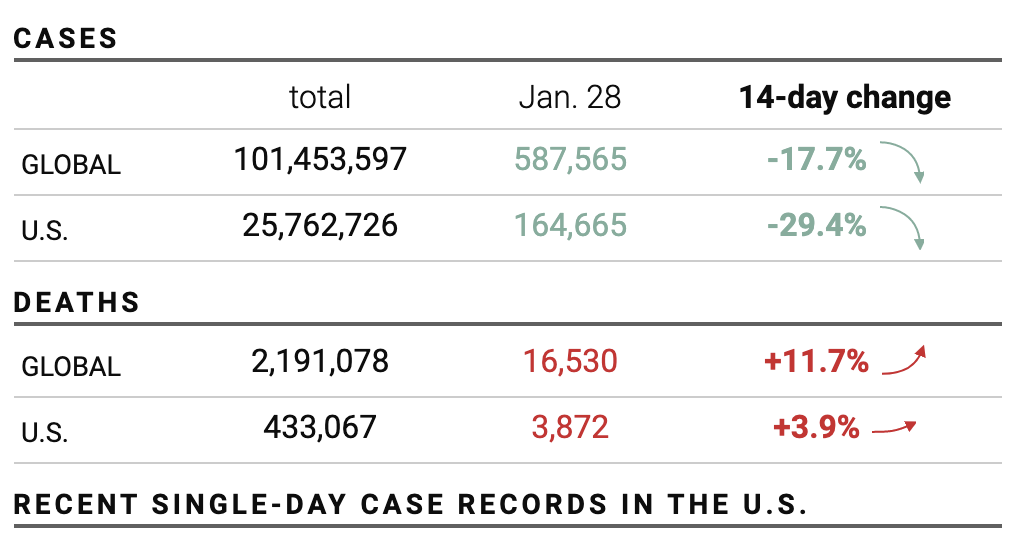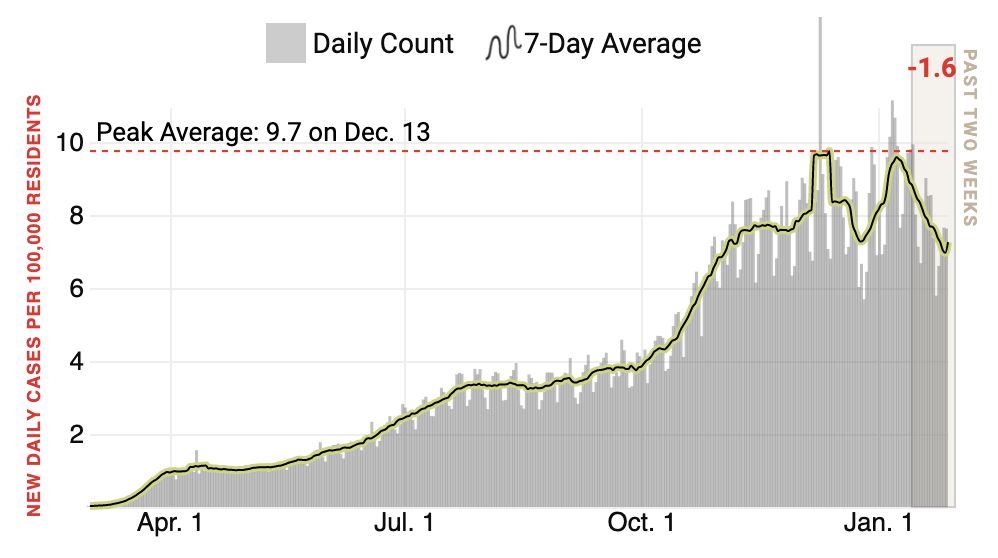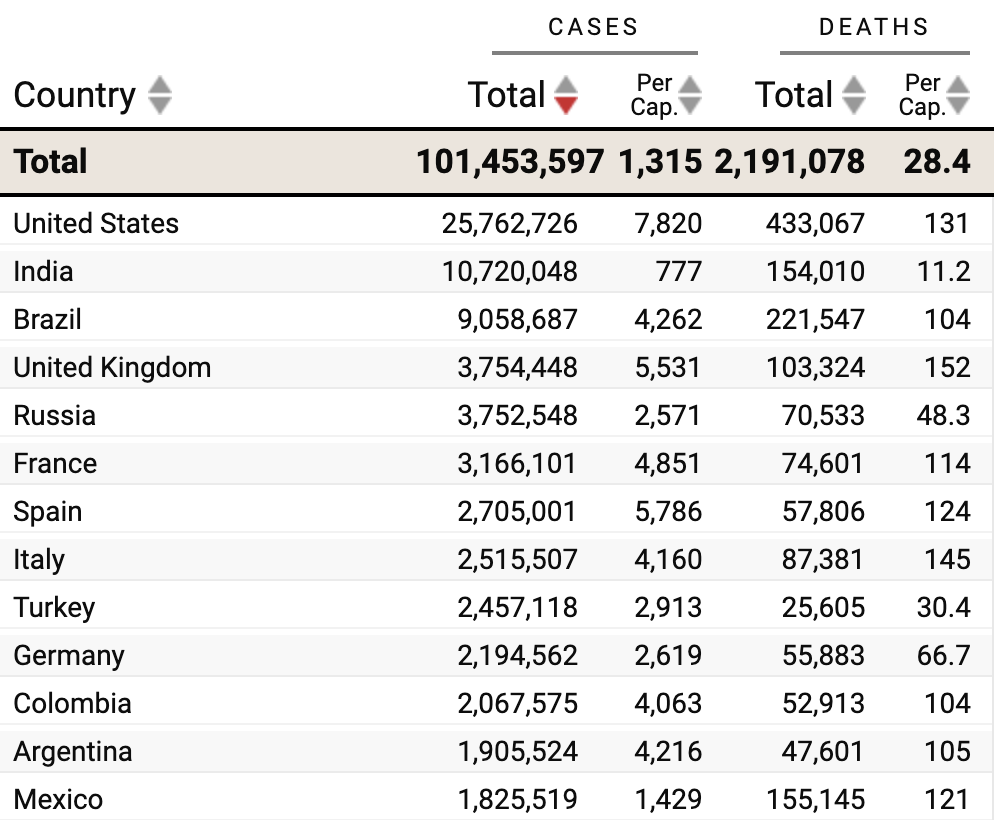Friday, January 28, 2020
BY JAMIE DUCHARME
Even More Vaccines Are (Likely) On the Way
It’s been a big 24 hours for (mostly good) vaccine news. Here’s what you should know.
Yesterday, Maryland-based company Novavax announced that its vaccine candidate is about 90% effective at preventing symptomatic COVID-19. Beyond that solid result, the vaccine may be easier to distribute than some other vaccines. It can be stored in a standard refrigerator, for one thing, and it ships in a liquid form, meaning it can be administered right away, unlike shots that come frozen.
Novavax’s announcement did contain some less exciting news, though. While the shot seems to stand up well to the viral variant that originated in the U.K., it was only about 50% effective in a small study in South Africa—suggesting it did not work as well against a variant that originated there. That’s better than nothing, but the preliminary efficacy rate was low enough that company executives told the New York Times they’ll begin testing a new vaccine made specifically for the South African variant.
In other vaccine developments, Johnson & Johnson’s Janssen Pharmaceutical Companies—which is making the only single-dose COVID-19 vaccine currently in development—said today its vaccine candidate is about 66% effective at preventing moderate-to-severe COVID-19, and 85% effective at preventing severe disease. Like Novavax’s shot, Janssen’s appeared less effective in South Africa.
Those results may seem disappointing when other COVID-19 vaccines have shown overall efficacy rates of 90% or higher. But its high efficacy against severe disease is a key metric, and as my colleague Alice Park reports, the shot has some upsides over others on the market. The fact that it’s a single-dose vaccine and can be stored in standard refrigeration, for instance, makes Johnson & Johnson’s shot a strong candidate for countries that do not have robust health care systems or the capacity for ultra-cold storage, which is required for Pfizer-BioNTech’s vaccine.
“It will be up to global health leaders to decide if the convenience of administering the single dose, and its ability to be stored under refrigerated conditions, is enough to justify the lower overall efficacy of Janssen’s shot,” Alice writes.
VACCINE TRACKER
While 32.7 million doses of the COVID-19 vaccine have been shipped to various U.S. states as of this morning, only about 21.7 million doses have been administered thus far, according to TIME’s vaccine tracker—representing 6.5% of the overall U.S. population.

European Union regulators today approved AstraZeneca’s vaccine for all adults, making it available alongside the shots made by Pfizer-BioNTech and Moderna. That decision was somewhat surprising, since some experts and health officials voiced concerns about inadequate data related to the vaccine’s use among elderly adults. Nevertheless, the shot was authorized without age restrictions.
That decision may trace back to the E.U.’s disappointingly slow vaccine rollout. Despite all the criticism of the U.S. vaccination campaign, things are even worse in Europe, as the BBC reports. The U.S. has administered about seven vaccine doses per 100 people, compared to just 2.3 doses per 100 people in the E.U. Part of the problem, according to the BBC, is that even though many COVID-19 shots are manufactured in Europe, the bloc has not received as many vaccine doses from manufacturers as expected. An influx from AstraZeneca would be a welcome relief.
TODAY’S CORONAVIRUS OUTLOOK

The Global Situation
More than 101.4 million people around the world had been diagnosed with COVID-19 as of 1 a.m. E.T. today, and nearly 2.2 million people have died. On Jan. 28, there were 587,565 new cases and 16,530 new deaths confirmed globally.
Here’s how the world as a whole is currently trending:

Here’s where daily cases have risen or fallen over the last 14 days, shown in confirmed cases per 100,000 residents:

And here is every country with over 1.5 million confirmed cases:

Mexico now has the world’s third-highest official COVID-19 death toll, surpassing India and placing it behind only the U.S. and Brazil. Worth noting: Mexico has reported far fewer cases than other countries with high death counts. India, for example, has recorded more than 10 million cases and about 154,000 deaths. Mexico, by contrast, has recorded only 1.8 million cases, but 155,000 deaths. That suggests many more people have been infected in Mexico than has been officially reported.
Vietnam, one of the world’s pandemic success stories, is struggling to contain a new outbreak that has spread to its capital city of Hanoi, the South China Morning Post reports. About 150 people have tested positive since yesterday, and some of those people may have been exposed to the more contagious variant circulating widely in the U.K. Health officials said today they plan to begin a mass testing campaign in Hai Duong province (east of Hanoi) and other affected areas.
Germany is moving ahead with a near-total ban on travel from Britain, Portugal, Brazil and South Africa—areas where extra-contagious viral variants are spreading rapidly—even as the European Union tries to coordinate a bloc-wide plan. “We cannot expect a European solution that meets our expectations any time soon, so are preparing national measures,” German Interior Minister Horst Seehofer said yesterday. Germany, which has recorded more than 2 million COVID-19 cases since the pandemic began, has recently reported about 15,000 new cases per day.
The Situation in the U.S.
The U.S. had recorded nearly 25.7 million coronavirus cases as of 1 a.m. E.T. today. More than 433,000 people have died. On Jan. 28, there were 164,665 new cases and 3,872 new deaths confirmed in the U.S.
Here’s how the country as a whole is currently trending:

Here’s where daily cases have risen or fallen over the last 14 days, shown in confirmed cases per 100,000 residents:

The Biden Administration has signaled it will take a more aggressive approach to travel during the pandemic than the Trump Administration did. It has expanded international arrival bans, required that international travelers test negative for COVID-19 before flying to the U.S., and explored the possibility of requiring tests before domestic flights. But U.S. airlines are opposed to the idea of mandatory domestic testing, ABC News reports, arguing that it would be costly, difficult and unnecessary. “It would have us testing Americans on airplanes that we all know are safe to be on,” American Airlines CEO Doug Parker said during a recent earnings call.
This fall, about 400 students at The State University of New York at Oneonta tested positive for COVID-19, in one of the worst campus outbreaks in the country. The school is set to resume in-person classes for the spring semester Monday—to the outrage of many students, staff and alumni, as the New York Times reports. The controversy at Oneonta reflects the larger challenges facing the higher education system, as schools weigh the costs and benefits of returning to campus.
All numbers unless otherwise specified are from the Johns Hopkins University Center for Systems Science and Engineering, and are accurate as of Jan. 29, 1 a.m. E.T. To see larger, interactive versions of these maps and charts, click here.
WHAT ELSE YOU SHOULD KNOW
Smoking Rates May Be Creeping Back Upward
Cigarette sales have been trending downward for decades. But they stopped declining in 2020, when the stress, idle time and (in some cases) spare money of lockdown apparently pushed some people back toward smoking, the Wall Street Journal reports. Read more here.
The Lives Lost to COVID-19
Capt. W. Chris Mertz, a 30-year veteran of California’s Rancho Santa Fe Fire Protection District, died from COVID-19 complications on Jan. 20. Mertz, who joined response efforts after 9/11 and Hurricane Katrina, was 54. Read more here.
Businesses Need to Do More for Employees’ Mental Health
Writing for TIME, Synchrony Financial CEO Margaret Keane argues businesses should offer benefits like access to wellness counselors, life coaches and teletherapy—especially during the pandemic. Read more here.
Thanks for reading. We hope you find the Coronavirus Brief newsletter to be a helpful tool to navigate this very complex situation, and welcome feedback at coronavirus.brief@time.com. If you have specific questions you’d like us to answer, please send them to covidquestions@time.com.
If you were forwarded this and want to sign up to receive it daily, click here.
Today’s newsletter was written by Jamie Ducharme and edited by Alex Fitzpatrick.
